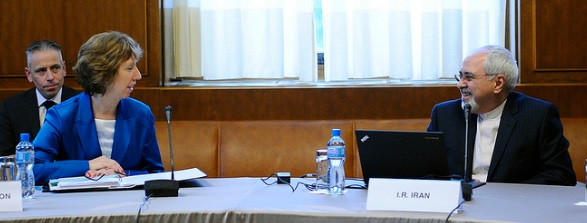After talks on October 15 and 16, Iran and the world’s six powers reported that the nuclear talks were “substantive and forward looking.” Iranian Foreign Minister Mohammad Javad Zarif told reporters, “We hope that this is a beginning of a new phase in our relations.” It was the sixth round of negotiations since 2011. But the closed-door meetings in Geneva were the first since the June election of President Hassan Rouhani, who had pledged to resolve the nuclear dispute during his campaign. The talks included the top nuclear negotiators from the United States, Britain, China, France, Germany and Russia. The next round will be held in Geneva on November 7 and 8.

“We had detailed technical discussions at a level we have not had before,” said a senior U.S. diplomat. “The differences between the two sides are still numerous; but we are on a path that would have them resolved,” echoed Iran’s deputy foreign minister for international and legal affairs, Abbas Araghchi. The pace of talks was reportedly quicker than in the past because they were conducted in English for the first time. But the delegations declined to provide details. The following are excerpted remarks by top officials from Iran and the world’s six major powers.
E.U. High Representative Catherine Ashton and Iranian Foreign Minister Mohammad Javad Zarif
“Delegations of the E3+3 and the Islamic Republic of Iran, led respectively by the E.U. High Representative for Foreign and Security Policy and Foreign Minister of Iran, held two days of substantive and forward looking negotiations in Geneva on 15 and 16 October 2013.
“Building on the positive atmosphere of the first ministerial meeting held in New York on 26 September, the Foreign Minister of the Islamic Republic of Iran presented an outline of a plan as a proposed basis for negotiation, which is being carefully considered by the E3+3 as an important contribution.
“Members of delegations followed with in-depth bilateral and joint consultations on various elements of the approach. It was decided to convene the next meeting in Geneva on November 7 and 8. The participants also agreed that E3+3 and Iranian nuclear, scientific and sanctions experts will convene before the next meeting to address differences and to develop practical steps.”
Oct. 16, 2013 in a joint statement
Iranian Foreign Minister Mohammad Javad Zarif
“We hope that this is a beginning of a new phase in our relations [with the outside world]. [Talks were] extensive and fruitful [and] exhibited the necessary political will to move the process forward.
“We will not back down on our rights. At the same time, we feel there is no need for concerns about our nuclear program... It is logical to remove any concerns though.
“I am hopeful that we can reach the mutual objectives… the detailed part is the most difficult part.
“We need to take reciprocal steps, but this is a very important test in our eyes for the P5+1 to win back the trust of Iran. I believe an important step was taken in this round.”
Oct. 16, 2013 to reporters
Senior Administration Official
“Over the past two days, we’ve had serious and substantive discussions with our P5 counterparts and with Iran. We had detailed technical discussions at a level we have not had before. And we discussed concrete steps and actions that are necessary for Iran to address the international community’s concerns about its nuclear program.
“Iran addressed what they saw as the objective, what should be in a final step, and what they might do as a first step. This is a framework that the P5+1 has used for some time. Although there remain many differences in each area and in what sanctions relief might be appropriate, specific and candid discussions took place.
“Throughout this process, the P5+1 has remained united, as we always have.
“We also had our first bilateral meeting at the political director level with the Iranians during the P5+1 since 2009, when then Political Director, Under Secretary Bill Burns sat down with Saeed Jalili right here in Geneva. Our discussion bilaterally yesterday was a useful one.
“There is more work – much more work – to do, as we knew there would be. We have always said that there would be no agreement overnight, and we’ve been clear that this process is going to take some time. The issues are complex, very technical, and require sound verification. Any agreement has to give the United States and the world every confidence that Iran will not acquire a nuclear weapon.
“As you heard High Representative Ashton say, we will be meeting again here in Geneva on November 7th and 8th. There will also be an experts meeting with the P5 and with the Iranians in advance of that round. And as was said in the statement, that will include nuclear, scientific, and sanctions experts for that meeting.
“We have said that there is time for diplomacy, but as Iran’s program continues, we must move both cautiously and quickly.
“We came to Geneva looking to have a substantive discussion, to hear Iran’s proposed approach, to begin to work through some of the technical details that have proven so elusive in the past, and to underscore for Iran all of our continued concerns and our approach to this problem. All of that occurred.
Oct. 16, 2013 at a background briefing
Photo credit: EU High Representative Catherine Ashton and Iran Foreign Minister, Javad Zarif by European External Action Service via Flickr

